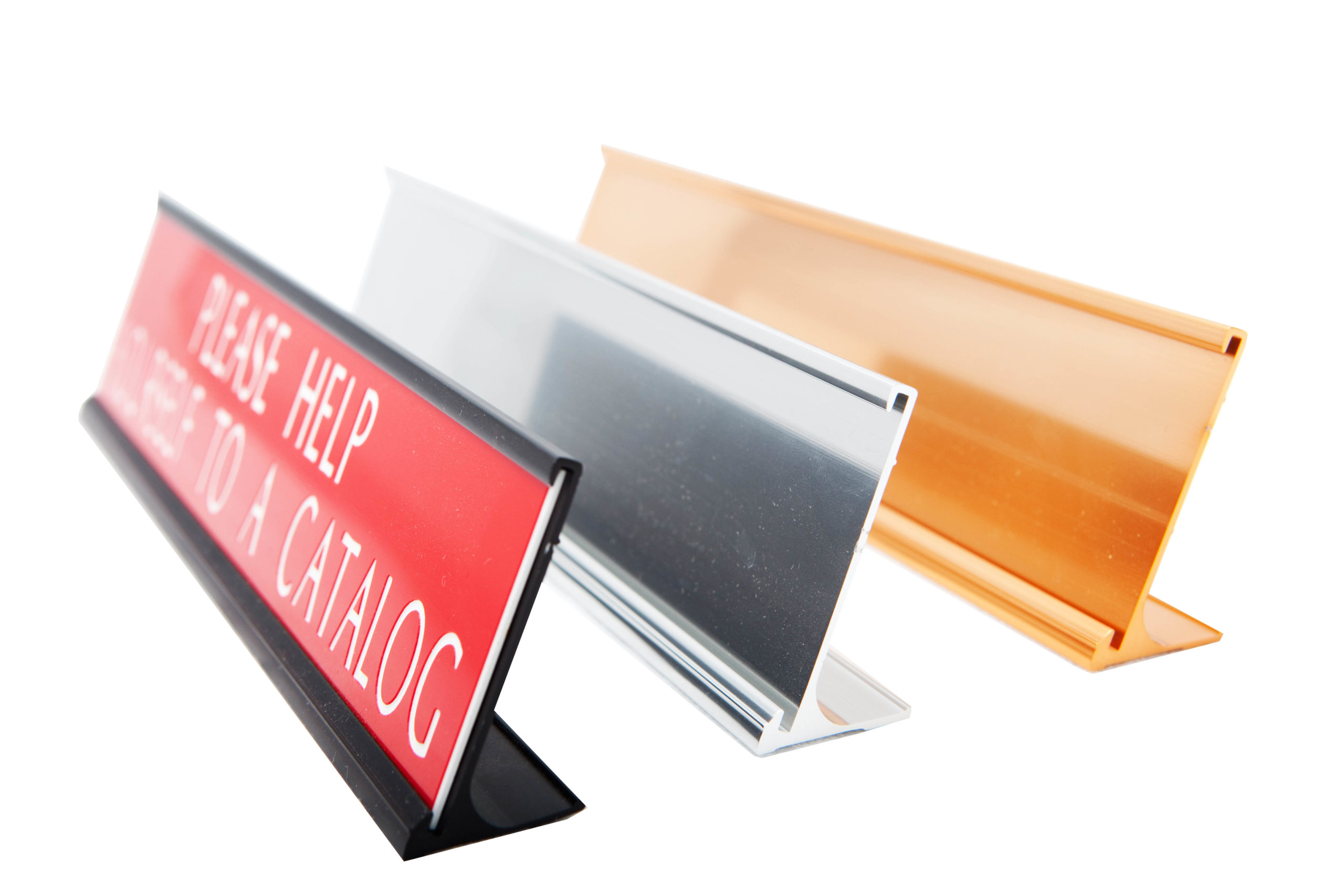What Custom Features to Consider When Ordering Plastic Nameplates
What Custom Features to Consider When Ordering Plastic Nameplates
Blog Article
Exactly How Plastic Nameplates Are Manufactured: A Comprehensive Overview to Their Manufacturing Refine
The production of plastic nameplates entails a number of accurate actions, beginning with the choice of ideal products to the final finishing touches. Each stage is crucial, making sure the item satisfies particular needs for resilience and appearances. Various production methods play a significant role in crafting these nameplates. Recognizing these procedures can shed light on the complexities behind what might look like an easy item. What elements add to the high quality and personalization of these nameplates?
Recognizing Plastic Materials Used for Nameplates

The Layout Process: From Idea to Prototype
The style process for plastic nameplates begins with a clear concept that guides the overall development. Developers collaborate with customers to define the purpose, style, and particular needs of the nameplate. This preliminary stage consists of brainstorming sessions, laying out concepts, and choosing shades and typefaces that straighten with branding goals.Once the concept is developed, designers utilize computer-aided design (CAD) software application to produce thorough electronic representations. These models allow for visualization and modifications prior to relocating forward. Comments from stakeholders is integral during this phase, as it assists refine the design to satisfy expectations.After settling the electronic prototype, a physical model might be created, typically with techniques like 3D printing. This concrete representation allows additional evaluation of looks and performance. Generally, the style procedure is an essential action that lays the structure for the effective production of high-grade plastic nameplates.
Cutting and Shaping the Plastic
In the cutting and shaping stage of plastic nameplate manufacturing, the option of products plays an essential role in establishing the last product's top quality and longevity (Plastic Nameplates). Different accuracy reducing methods, such as laser cutting and CNC machining, assurance that the plastic is shaped with precision and consistency. This combination of mindful material choice and progressed reducing approaches is crucial for generating top notch nameplates

Material Choice Refine
Picking the right material is important for generating top notch plastic nameplates. Numerous types of plastics are readily available, each offering distinctive advantages and characteristics. Common choices consist of acrylic, polycarbonate, and PVC. Polymer is favored for its clarity and UV resistance, making it excellent for outdoor applications. Polycarbonate, known for its durability and influence resistance, appropriates for environments that call for enhanced security. PVC is frequently chosen for its cost-effectiveness and versatility in style. The choice procedure also takes into consideration elements such as density, surface area, and shade finish, which can considerably affect the final look and functionality of the nameplate. Eventually, the picked material has to line up with the planned use and visual goals of the plastic nameplate.
Accuracy Trimming Strategies
While choosing the appropriate product lays the groundwork, precision reducing strategies play a necessary duty in shaping the plastic nameplates into their last forms. Different techniques, including laser cutting, CNC milling, and die reducing, are employed to accomplish precision and consistency. Laser reducing makes use of concentrated light to create clean sides and detailed designs, ideal for complex patterns. CNC milling uses convenience by eliminating excess material with precision, accommodating numerous densities and forms. Pass away reducing, on the other hand, enables automation of consistent pieces, boosting efficiency. Each method is picked based on the style specifications and the wanted coating, making sure that the last product satisfies top quality standards and client expectations while keeping longevity and visual allure.
Printing Methods for Modification
Just how can producers accomplish precise and dynamic layouts on plastic nameplates? The answer depends on various printing strategies tailored for customization. Digital printing has gotten appeal due to its ability to create high-resolution photos and complex designs directly onto plastic surface areas. This approach permits fast turn-around times and very little arrangement costs, making it suitable for brief runs and individualized orders.Screen printing stays another extensively made use of method, especially for larger quantities. It involves creating a stencil and using layers of ink, resulting in abundant shades and toughness. UV printing, which uses ultraviolet light to treat the ink, is also reliable, providing outstanding adhesion and resistance to fading.Additionally, pad printing supplies adaptability for irregularly designed nameplates, enabling in-depth designs on tough surfaces. These printing approaches allow suppliers to fulfill varied customer requires while making sure top quality and long life in their plastic nameplate products.
Surface Therapies and Finishing Options

Quality Assurance Measures in Manufacturing
Guaranteeing the highest standards of high quality control during the production of plastic nameplates is crucial for keeping item stability and client contentment. Producers execute rigorous evaluation protocols at various stages of the manufacturing process. At first, resources undertake detailed screening to verify they fulfill requirements for durability and shade uniformity. During the molding stage, automated systems keep track of parameters such as temperature and stress to avoid defects.In addition, aesthetic assessments are carried out to determine any surface blemishes or misalignments. Once the nameplates are created, they go through functional examinations, including adhesion examinations for printed components and cardiovascular test for longevity. Quality control teams often use statistical tasting methods to assess sets, making sure that any type of deviations from standards are quickly attended to. This thorough approach not only improves product quality but also fosters depend on with customers, attesting the manufacturer's dedication to excellence in every nameplate created.
Packaging and Circulation of Finished Nameplates
The product packaging and distribution of completed plastic nameplates are essential action in guaranteeing they get to customers in optimal condition. Numerous packaging materials are chosen to safeguard the nameplates throughout transportation, while delivering methods are meticulously chosen based on efficiency and cost-effectiveness. In addition, reliable storage space solutions are executed to preserve high quality up until the nameplates are supplied.
Product Packaging Products Utilized
Picking suitable product packaging materials is important to assure their security throughout transit when distributing ended up plastic nameplates. Typically used materials include bubble cover, foam padding, and cardboard boxes, all developed to cushion the nameplates versus shocks and influences. Bubble wrap provides a flexible obstacle, while foam cushioning warranties that nameplates continue to be securely in position, minimizing the threat of scratches or breakage. In addition, durable cardboard boxes are utilized to include the nameplates, supplying structural support and defense from outside components. Labels might be applied to show managing directions or breakable components, even more enhancing safety and security during transport. On the whole, making use of high-grade packaging products considerably adds to the integrity and presentation of the ended up plastic nameplates upon arrival at their location.
Delivering Approaches Employed
Effective distribution of ended up plastic nameplates counts on different delivery methods that assure prompt and protected delivery. Companies usually utilize courier solutions, products delivery, and postal solutions, depending on the dimension, weight, and destination of the bundles. For regional distributions, messenger services offer fast transit, making sure nameplates get to consumers rapidly. For larger orders, products delivery is chosen, utilizing vehicles or shipping containers to deliver mass amounts effectively. Post offices act as a cost-effective option for smaller deliveries, specifically for domestic shipments. All shipping techniques prioritize protective product packaging to stop damages during transportation. Tracking systems are additionally made use click site of to monitor shipments, providing customers with real-time updates and reassurance pertaining to the condition of their orders.
Storage Space Solutions Implemented

Often Asked Inquiries
What Kinds of Services Typically Use Plastic Nameplates?
Plastic nameplates are generally used by numerous organizations, including workplaces, hospitals, manufacturing facilities, and schools. These nameplates serve essential functions such as identification, info display screen, and branding, adding to organizational performance and specialist look throughout varied environments.
For how long Does the Entire Production Process Take?
The production procedure duration differs based on intricacy and amount, commonly varying from a few days to a number of weeks. Aspects influencing this timeline consist of layout authorization, product accessibility, and production methods utilized by the firm.
Can Plastic Nameplates Be Recycled After Usage?
Plastic nameplates can be recycled, offered they are made from recyclable products. The accessibility of recycling programs and local guidelines might impact their recyclability. Appropriate disposal practices are vital to guarantee efficient recycling.
What Are the Ecological Influences of Plastic Nameplate Manufacturing?
The ecological influences of plastic nameplate production consist of carbon exhausts, source exhaustion, and pollution from manufacturing procedures. Plastic Nameplates. In addition, improper disposal adds to plastic waste, detrimentally affecting ecosystems and wildlife, highlighting the need for sustainable techniques
Are There Any Security Interest In Plastic Nameplates?
Safety and security problems relating to plastic nameplates primarily involve potential chemical direct exposure during manufacturing and the risk of materials deteriorating in time, which may cause harmful compounds being launched, influencing both human wellness and the atmosphere. While numerous materials can be made use of for nameplates, plastic remains a prominent choice due to its convenience and durability. In the cutting and read the article shaping stage of plastic nameplate manufacturing, the selection of products plays a necessary role in establishing the final product's top quality and toughness. Choosing the appropriate material is essential for producing top quality plastic nameplates. While picking the proper product lays the groundwork, accuracy reducing strategies play an essential role in forming the plastic nameplates into their final types. When distributing completed plastic nameplates, choosing suitable product packaging materials is vital to assure their defense throughout transportation.
Report this page